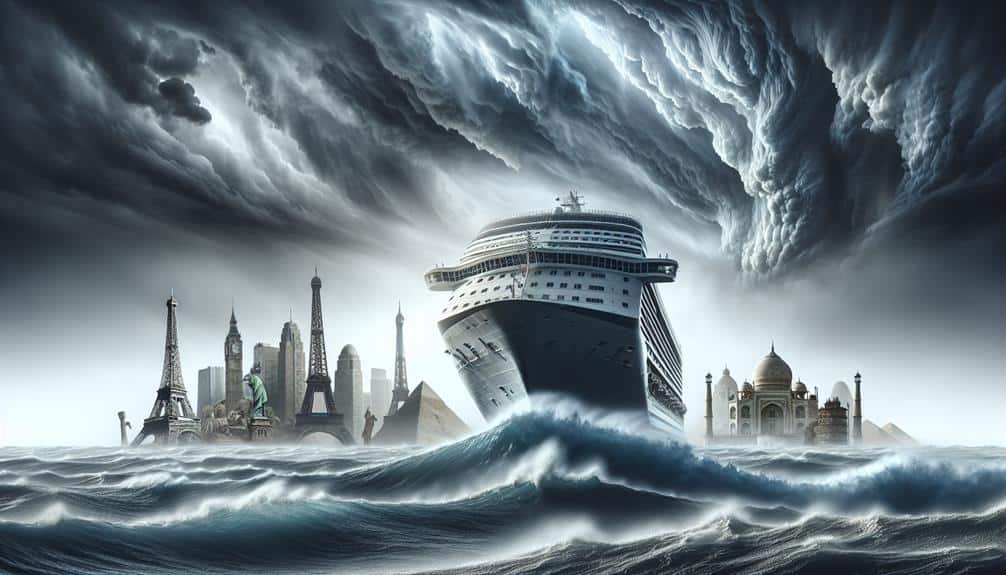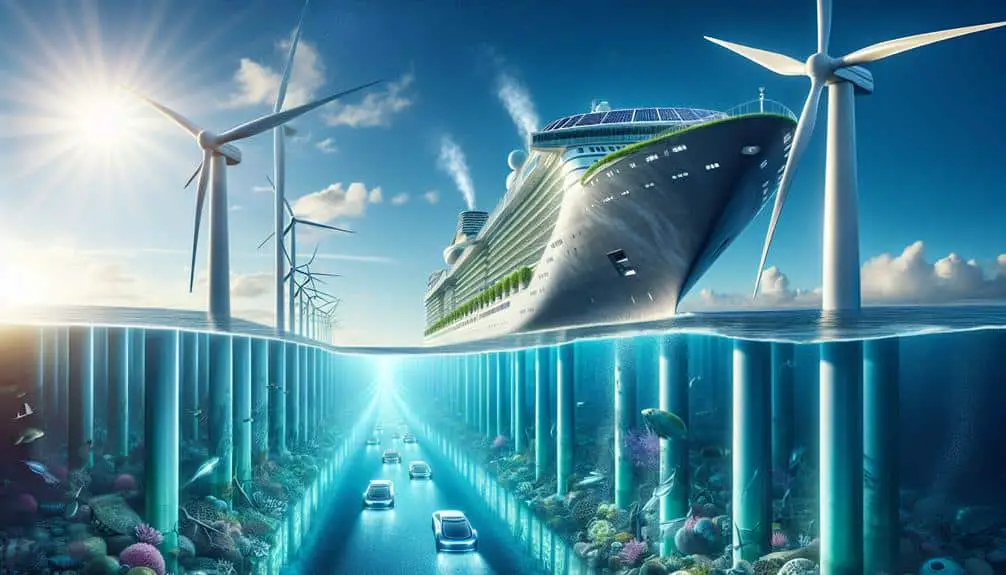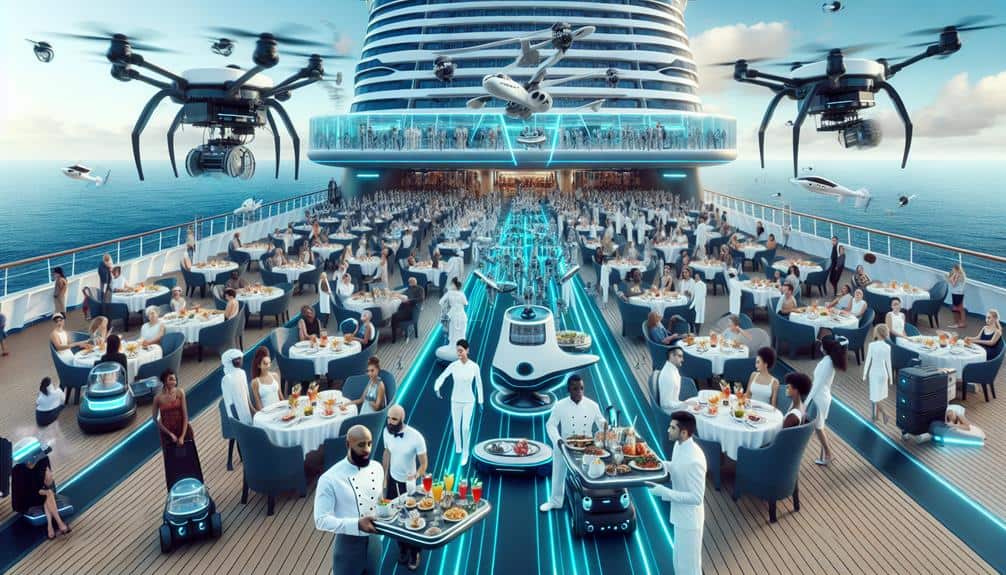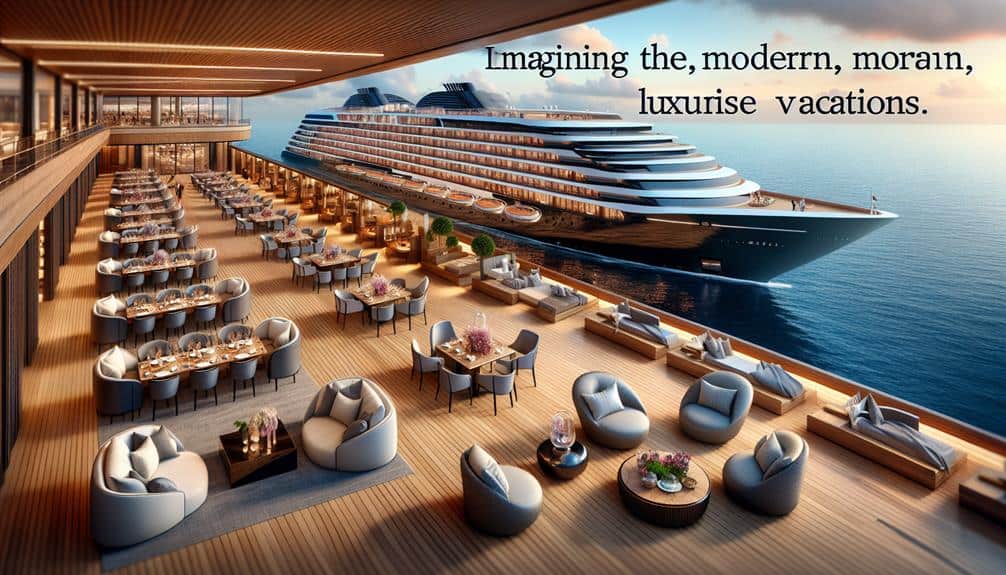Global events like pandemics and geopolitical tensions impact the cruise industry by shifting passenger preferences and operational strategies. Economic conditions influence ticket prices and demand, while safety concerns shape industry resilience. Itineraries now focus on sustainable and authentic experiences. Technological advancements enhance operations and guest experiences. Passengers now seek personalized and eco-friendly travel options. These events mold the industry trends, emphasizing safety, sustainability, and guest satisfaction.
Key Points
- Global events impact consumer confidence and travel decisions.
- Economic trends affect passenger demand and industry performance.
- Geopolitical events influence itinerary planning and destination choices.
- Travel restrictions due to global events impact cruise operations.
- Industry adapts to global events by prioritizing safety and security measures.
Economic Impact on Cruise Industry
The economic impact on the cruise industry can be clearly seen through the fluctuation in passenger demand and ticket prices based on global economic conditions. Financial implications play a significant role in shaping the industry's landscape. Market fluctuations, influenced by factors like geopolitical events and economic trends, directly affect consumer confidence and travel restrictions, ultimately impacting the cruise industry's performance.
Consumer confidence acts as a key indicator of how willing individuals are to spend on leisure activities such as cruising. During periods of economic uncertainty, consumer confidence tends to decrease, leading to a potential decline in demand for cruise vacations. This decrease in demand can result in cruise lines adjusting their ticket prices to attract more passengers, further showcasing the industry's sensitivity to economic conditions.
Moreover, travel restrictions imposed due to global events can severely constrain the cruise industry's operations, limiting the number of destinations accessible to cruise ships and potentially deterring passengers from booking trips. Understanding these intricate connections between financial implications, market fluctuations, consumer confidence, and travel restrictions is vital for stakeholders in the cruise industry to navigate challenges and capitalize on opportunities effectively.
Safety and Security Concerns
Traversing the intricate landscape of the cruise industry requires a keen awareness of the evolving safety and security concerns that impact both passengers and industry stakeholders alike. Cruise lines prioritize safety through meticulous emergency protocols and rigorous staff training. When emergencies arise at sea, well-defined procedures guarantee a swift and coordinated response to protect passengers and crew.
Effective emergency protocols encompass a range of scenarios, from medical emergencies to extreme weather conditions or even rare events like onboard fires. Cruise companies invest heavily in training their staff to handle these situations with professionalism and efficiency. Thorough staff training programs cover first aid, crowd management, evacuation procedures, and communication protocols to ensure a quick and organized response in times of crisis.
These safety measures not only safeguard passengers but also contribute to the overall resilience of the cruise industry. By continuously refining emergency protocols and enhancing staff training, cruise lines demonstrate their dedication to providing a secure and reliable travel experience for all.
Shift in Itineraries and Destinations
Amidst global shifts and evolving trends, the cruise industry is witnessing notable adjustments in itineraries and destinations. As the industry adapts to changing consumer preferences, a significant focus is being placed on sustainable tourism and cultural immersion experiences. Cruise lines are strategically selecting ports of call that align with sustainable practices to minimize environmental impact. Destinations that offer authentic cultural experiences are becoming increasingly popular among travelers seeking meaningful interactions and a deeper understanding of local traditions.
In response to these trends, cruise itineraries are being redesigned to include lesser-known ports and off-the-beaten-path locations that promote cultural immersion. By offering unique experiences that go beyond typical tourist attractions, cruise companies are catering to a growing demand for authentic and enriching travel experiences. This shift towards sustainable tourism and cultural immersion not only benefits passengers seeking meaningful encounters but also has a positive impact on local communities by promoting responsible tourism practices.
As the cruise industry continues to evolve, these changes in itineraries and destinations reflect a broader commitment to providing enriching and sustainable travel experiences.
Technological Advancements in Response
Global events are prompting the cruise industry to rapidly adopt technological advancements to enhance guest experiences and operational efficiency. In response to the changing landscape, cruise lines are leveraging innovative solutions and undergoing significant digital transformation. Here are four key areas where technology is reshaping the industry:
- Smart Ships: Cruise companies are investing in smart technologies like IoT sensors and AI-driven analytics to optimize operations, improve safety, and personalize guest services.
- Virtual Reality (VR) Experiences: VR is being used to offer virtual tours of cruise ships, allowing potential passengers to explore cabins, amenities, and onboard activities before booking.
- Mobile Apps: Cruise lines are developing sophisticated mobile apps that enable guests to access real-time information, make reservations, and customize their cruise experience.
- Contactless Solutions: To enhance health and safety measures, cruise operators are implementing contactless technologies for check-ins, payments, and onboard interactions.
These technological advancements not only elevate the guest experience but also streamline operations, making the cruise industry more resilient in the face of global challenges.
Changing Passenger Preferences
As the cruise industry rapidly adopts technological advancements to meet evolving guest expectations and operational demands, a shift in passenger preferences is becoming increasingly evident. Today's cruise passengers are seeking more than just a traditional vacation; they crave personalized experiences that cater to their individual tastes and preferences. This demand for tailored experiences has led cruise lines to invest heavily in technology that enables them to gather data on passenger behaviors and preferences, allowing them to offer highly customized services and activities onboard.
Moreover, sustainability initiatives have also emerged as a key factor in shaping passenger preferences. Modern travelers are increasingly conscious of environmental issues and are actively seeking out cruise lines that demonstrate a commitment to sustainability. From reducing single-use plastics to implementing energy-efficient technologies, cruise companies are under pressure to adopt eco-friendly practices to meet the demands of today's environmentally conscious passengers.
Frequently Asked Questions
How Do Cruise Lines Prepare for Potential Global Events That May Impact Their Business?
When prepping for global events, cruise lines perform crisis management drills, conduct thorough risk assessments, and strategize responses. By staying vigilant and adaptable, they mitigate potential disruptions, ensuring a smoother sailing experience for passengers.
Are There Any Specific Regions or Routes That Are More Vulnerable to Safety and Security Concerns in the Cruise Industry?
When evaluating regional vulnerability in the cruise industry, prioritize route analysis for safety concerns. Identify security risks in specific areas to enhance preparedness. Stay informed and adapt strategies to mitigate potential threats effectively.
How Do Cruise Lines Decide on New Itineraries and Destinations in Response to Global Events?
When cruise lines decide on new itineraries and destinations in response to global events, they carefully analyze industry response strategies. By considering passenger safety, market demands, and geopolitical factors, cruise companies navigate challenges and optimize routes.
What Specific Technological Advancements Have Been Implemented by Cruise Lines to Address Safety and Security Concerns?
To address safety concerns, cruise lines have implemented cutting-edge safety technology. Advanced monitoring systems, emergency response procedures, and enhanced communication tools guarantee passenger well-being. These technological advancements prioritize safety and security at sea.
How Do Changing Passenger Preferences Influence the Cruise Industry's Response to Global Events?
As passenger preferences evolve, cruise lines adapt marketing strategies to align with industry trends. By closely monitoring customer feedback, cruise companies can tailor experiences to meet changing demands, ensuring relevance and competitiveness in the market.




